“CATTI杯”第二十七届韩素音青年翻译奖竞赛-英译汉
第26届韩素音青年翻译奖大赛参赛试卷(英译汉)
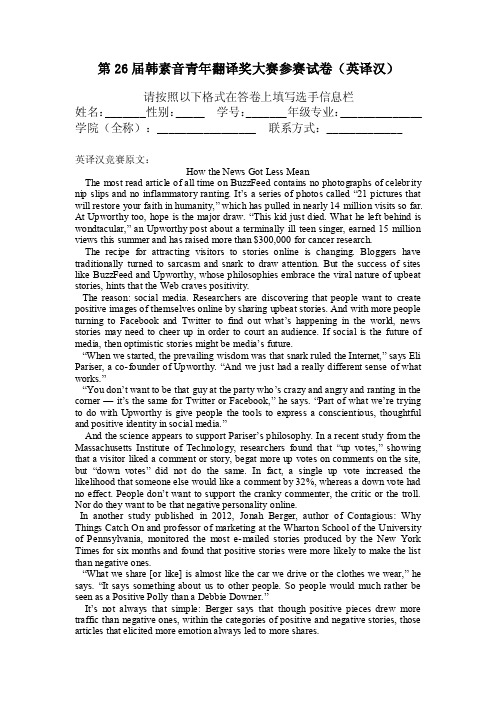
第26届韩素音青年翻译奖大赛参赛试卷(英译汉)请按照以下格式在答卷上填写选手信息栏姓名:_______性别:_____ 学号:_______年级专业:______________ 学院(全称):_________________ 联系方式:_____________英译汉竞赛原文:How the News Got Less MeanThe most read article of all time on BuzzFeed contains no photographs of celebrity nip slips and no inflammatory ranting. It’s a series of photos called “21 pictures that will restore your faith in humanity,” which has pulled in nearly 14 million visits so far. At Upworthy too, hope is the major draw. “This kid just died. What he lef t behind is wondtacular,” an Upworthy post about a terminally ill teen singer, earned 15 million views this summer and has raised more than $300,000 for cancer research.The recipe for attracting visitors to stories online is changing. Bloggers have traditionally turned to sarcasm and snark to draw attention. But the success of sites like BuzzFeed and Upworthy, whose philosophies embrace the viral nature of upbeat stories, hints that the Web craves positivity.The reason: social media. Researchers are discovering that people want to create positive images of themselves online by sharing upbeat stories. And with more people turning to Facebook and Twitter to find out what’s happening in the world, news stories may need to cheer up in order to court an audience. If social is the future of media, then optimistic stories might be media’s future.“When we started, the prevailing wisdom was that snark ruled the Internet,” says Eli Pariser, a co-founder of Upworthy. “And we just had a really different sense of what works.”“You don’t want to be that guy at the party who’s crazy and angry and ranting in the corner —it’s the same for Twitter or Facebook,” he says. “Part of what we’re trying to do with Upworthy is give people the tools to express a conscientious, thoughtful and positive identity in social media.”And the science appears to support Pariser’s philosophy. In a recent study from the Massachusetts Institute of Technology, researchers found that “up votes,” showing that a visitor liked a comment or story, begat more up votes on comments on the site, but “down votes” did not do the same. In fact, a single up vote increased the likelihood that someone else would like a comment by 32%, whereas a down vote had no effect. People don’t want to support the cranky commenter, the critic or the troll. Nor do they want to be that negative personality online.In another study published in 2012, Jonah Berger, author of Contagious: Why Things Catch On and professor of marketing at the Wharton School of the University of Pennsylvania, monitored the most e-mailed stories produced by the New York Times for six months and found that positive stories were more likely to make the list than negative ones.“What we share [or like] is almost like the car we drive or the clothes we wear,” he says. “It says something about us to other people. So people would much rather be seen as a Positive Polly than a Debbie Downer.”It’s not always that simple: Berger says that though positive pieces drew more traffic than negative ones, within the categories of positive and negative stories, those articles that elicited more emotion always led to more shares.“Take two negative emotions, for example: anger and sadness,” Berger says. “Both of those emotions would make the reader feel bad. But anger, a high arousal emotion, leads to more sharing, whereas sadness, a low arousal emotion, doesn’t. The same is true of the positive side: excitement and humor increase sharing, whereas contentment decreases sharing.”And while some popular BuzzFeed posts —like the recent “Is this the most embarrassing interview Fox News has ever done?” —might do their best to elicit shares through anger, both BuzzFeed and Upworthy recognize that their main success lies in creating positive viral material.“It’s not that people don’t share negative stories,” says Jack Shepherd, editorial director at BuzzFeed. “It just means that there’s a higher potential for positive stories to do well.”Upworthy’s mission is to highlight serious issues but in a hopeful way, encouraging readers to donate money, join organizations and take action. The strategy seems to be working: barely two years after its launch date (in March 2012), the site now boasts 30 million unique visitors per month, according to Upwort hy. The site’s average monthly unique visitors grew to 14 million people over its first six quarters — to put that in perspective, the Huffington Post had only about 2 million visitors in its first six quarters online.But Upworthy measures the success of a story not just by hits. The creators of the site only consider a post a success if it’s also shared frequently on social media. “We are interested in content that people want to share partly for pragmatic reasons,” Pariser says. “If you don’t have a g ood theory about how to appear in Facebook and Twitter, then you may disappear.”Nobody has mastered the ability to make a story go viral like BuzzFeed. The site, which began in 2006 as a lab to figure out what people share online, has used what it’s le arned to draw 60 million monthly unique visitors, according to BuzzFeed. (Most of that traffic comes from social-networking sites, driving readers toward BuzzFeed’s mix of cute animal photos and hard news.) By comparison the New York Times website, one of the most popular newspaper sites on the Web, courts only 29 million unique visitors each month, according to the Times.BuzzFeed editors have found that people do still read negative or critical stories, they just aren’t the posts they share with their friends. And those shareable posts are the ones that newsrooms increasingly prize.“Anecdotally, I can tell you people are just as likely to click on negative stories as they are to click on positive ones,” says Shepherd. “But they’re more likely to sh are positive stories. What you’re interested in is different from what you want your friends to see what you’re interested in.”So as newsrooms re-evaluate how they can draw readers and elicit more shares on Twitter and Facebook, they may look to BuzzFe ed’s and Upworthy’s happiness model for direction.“I think that the Web is only becoming more social,” Shepherd says. “We’re at a point where readers are your publishers. If news sites aren’t thinking about what it would mean for someone to share a story on social media, that coul be detrimental.”PS:1.请各位参赛选手关注我们的新浪微博:@安徽师范大学翻译协会2014,和腾讯微博:@安徽师范大学译协。
第十七届“韩素音青年翻译奖”赛中文原文及参考译文和解析
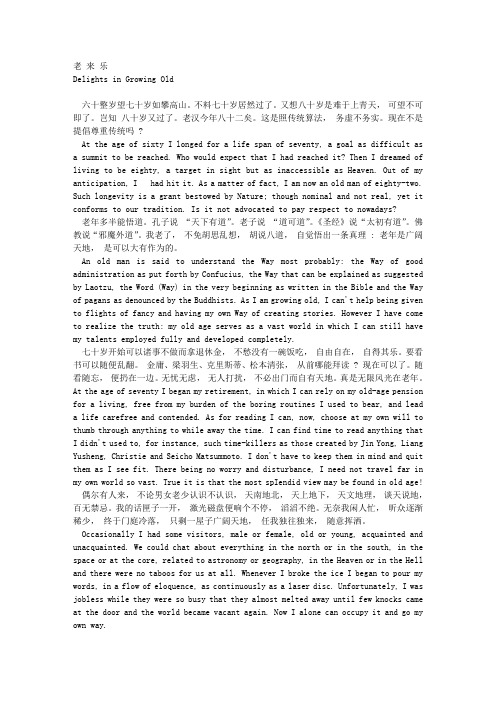
老来乐Delights in Growing Old六十整岁望七十岁如攀高山。
不料七十岁居然过了。
又想八十岁是难于上青天,可望不可即了。
岂知八十岁又过了。
老汉今年八十二矣。
这是照传统算法,务虚不务实。
现在不是提倡尊重传统吗 ?At the age of sixty I longed for a life span of seventy, a goal as difficult as a summit to be reached. Who would expect that I had reached it? Then I dreamed of living to be eighty, a target in sight but as inaccessible as Heaven. Out of my anticipation, I had hit it. As a matter of fact, I am now an old man of eighty-two. Such longevity is a grant bestowed by Nature; though nominal and not real, yet it conforms to our tradition. Is it not advocated to pay respect to nowadays?老年多半能悟道。
孔子说“天下有道”。
老子说“道可道”。
《圣经》说“太初有道”。
佛教说“邪魔外道”。
我老了,不免胡思乱想,胡说八道,自觉悟出一条真理 : 老年是广阔天地,是可以大有作为的。
An old man is said to understand the Way most probably: the Way of good administration as put forth by Confucius, the Way that can be explained as suggested by Laotzu, the Word (Way) in the very beginning as written in the Bible and the Way of pagans as denounced by the Buddhists. As I am growing old, I can't help being given to flights of fancy and having my own Way of creating stories. However I have come to realize the truth: my old age serves as a vast world in which I can still have my talents employed fully and developed completely.七十岁开始可以诸事不做而拿退休金,不愁没有一碗饭吃,自由自在,自得其乐。
翻译评析:第二十二届韩素音青年翻译奖竟赛汉译英译文和译文评析 1

幸福是什么模样,或许并不难回答。幸福就是一本摊开的诗篇,关于在城市的天空下,那些寻常巷陌的诗。
Perhaps it is not so difficult to define happiness after all. Happiness is an unfurled scroll of poems, describing ordinary alleys under the city skies.
蜗居在巷陌的寻常幸福
Simple Happiness of Dwelling in the Back Streets
隐逸的生活似乎在传统意识中一直被认为是幸福的至高境界。但这种孤傲遁世同时也是孤独的,纯粹的隐者实属少数,而少数者的满足不能用来解读普世的幸福模样。
A secluded life has traditionally been deemed, as it seems, the supreme state of happiness, although such aloofness and retirement breed loneliness as well. Few people in fact end up as genuine recluses, whose contentment does not suffice to construe what happiness is for all.
和来家中做客的邻居朋友用同一种腔调巧妙地笑谑着身边的琐事,大家眯起的眼睛都默契地闪着同一种狡黠;和家人一起围在饭桌前,衔满食物的嘴还发着含糊的声音,有些聒噪,但没人厌烦。
When neighbors and friends come, they share witty jokes about personal trivialities, implicitly understanding each other's eye movements of like astuteness. Family members sit around the dining table, chattering through mouthfuls of food, and no one is bothered by the noise.
第二十七届韩素音青年翻译比赛汉译英优秀奖的译文教学内容
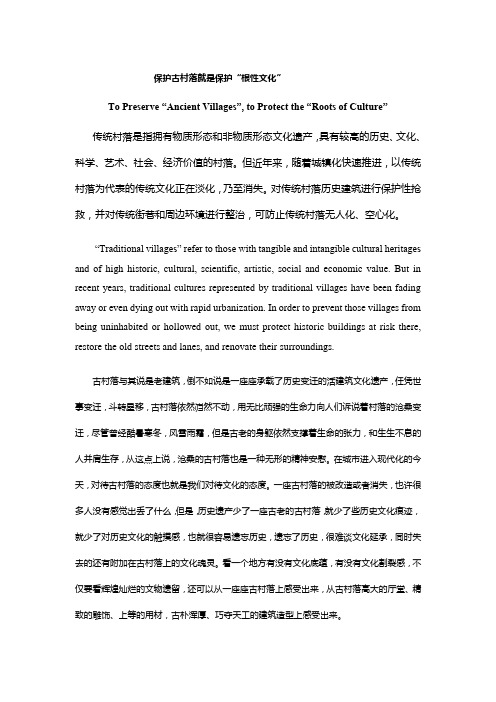
保护古村落就是保护“根性文化”To Preserve “Ancient Villages”, to Protect the “Roots of Culture”传统村落是指拥有物质形态和非物质形态文化遗产,具有较高的历史、文化、科学、艺术、社会、经济价值的村落。
但近年来,随着城镇化快速推进,以传统村落为代表的传统文化正在淡化,乃至消失。
对传统村落历史建筑进行保护性抢救,并对传统街巷和周边环境进行整治,可防止传统村落无人化、空心化。
“Traditional villages” refer to those with tangible and intangible cultural heritages and of high historic, cultural, scientific, artistic, social and economic value. But in recent years, traditional cultures represented by traditional villages have been fading away or even dying out with rapid urbanization. In order to prevent those villages from being uninhabited or hollowed out, we must protect historic buildings at risk there, restore the old streets and lanes, and renovate their surroundings.古村落与其说是老建筑,倒不如说是一座座承载了历史变迁的活建筑文化遗产,任凭世事变迁,斗转星移,古村落依然岿然不动,用无比顽强的生命力向人们诉说着村落的沧桑变迁,尽管曾经酷暑寒冬,风雪雨霜,但是古老的身躯依然支撑着生命的张力,和生生不息的人并肩生存,从这点上说,沧桑的古村落也是一种无形的精神安慰。
2017年韩音素翻译竞赛英译汉原文
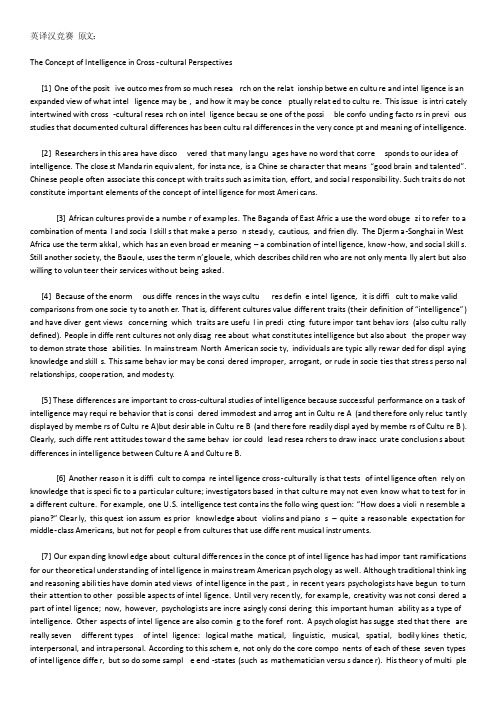
英译汉竞赛原文:The Concep t of Intell igenc e in Cross-cultur al Perspe ctive s[1] One of the positi ve outcom es from so much resear ch on the relati onshi p betwee n cultur e and intell igenc e is an expand ed view of what intell igenc e may be, and how it may be concep tuall y relate d to cultur e. This issueis intric ately intert wined with cross-cultur al resear ch on intell igenc e becaus e one of the possib le confou nding factor s in previo us studie s that docume ntedcultur al differ ences has been cultur al differ ences in the very concep t and meanin g of intell igenc e.[2] Resear chers in this area have discov eredthat many langua ges have no word that corres ponds to our idea of intell igenc e. The closes t Mandar in equiva lent, for instan ce, is a Chines e charac ter that means“good brainand talent ed”. Chines e people oftenassoci ate this concep t with traits such as imitat ion, effort, and social respon sibil ity. Such traits do not consti tuteimport ant elemen ts of the concep t of intell igenc e for most Americ ans.[3] Africa n cultur es provid e a number of exampl es. The Bagand a of East Africa use the word obugez i to referto a combin ation of mental and social skills that make a person steady, cautio us, and friend ly. The Djerma-Songha i in West Africa use the term akkal, whichhas an even broade r meanin g – a combin ation of intell igenc e, know-how, and social skills. Stillanothe r societ y, the Baoule, uses the term n’glouel e, whichdescri bes childr en who are not only mental ly alertbut also willin g to volunt eer theirservic es withou t beingasked.[4] Becaus e of the enormo us differ ences in the ways cultur es define intell igenc e, it is diffic ult to make validcompar isons from one societ y to anothe r. That is, differ ent cultur es valuediffer ent traits (theirdefini tionof “intell igenc e”) and have diverg ent viewsconcer ningwhichtraits are useful in predic tingfuture import ant behavi ors (also cultur allydefine d). People in differ ent cultur es not only disagr ee aboutwhat consti tutes intell igenc e but also aboutthe proper way to demons trate thoseabilit ies. In mainst reamNorthAmeric an societ y, indivi duals are typica lly reward ed for displa yingknowle dge and skills. This same behavi or may be consid eredimprop er, arroga nt, or rude in societ ies that stress person al relati onshi ps, cooper ation, and modest y.[5] Thesediffer ences are import ant to cross-cultur al studie s of intell igenc e becaus e succes sfulperfor mance on a task of intell igenc e may requir e behavi or that is consid eredimmode st and arroga nt in Cultur e A (and theref ore only reluct antly displa yed by member s of Cultur e A)but desira ble in Cultur e B (and theref ore readil y displa yed by member s of Cultur e B). Clearl y, such differ ent attitu des toward the same behavi or couldlead resear chers to draw inaccu rateconclu sions aboutdiffer ences in intell igenc e betwee n Cultur e A and Cultur e B.[6] Anothe r reason it is diffic ult to compar e intell igenc e cross-cultur allyis that testsof intell igenc e oftenrely on knowle dge that is specif ic to a partic ularcultur e; invest igato rs basedin that cultur e may not even know what to test for in a differ ent cultur e. For exampl e, one U.S. intell igenc e test contai ns the follow ing questi on: “How does a violin resemb le a piano?” Clearl y, this questi on assume s priorknowle dge aboutviolin s and pianos–quitea reason ableexpect ation for middle-classAmeric ans, but not for people from cultur es that use differ ent musica l instru ments.[7] Our expand ing knowle dge aboutcultur al differ ences in the concep t of intell igenc e has had import ant ramifi catio ns for our theore tical unders tandi ng of intell igenc e in mainst reamAmeric an psycho logyas well. Althou gh tradit ional thinki ng and reason ing abilit ies have domina ted viewsof intell igenc e in the past, in recent yearspsycho logis ts have begunto turn theirattent ion to otherpossib le aspect s of intell igenc e. Untilvery recent ly, for exampl e, creati vitywas not consid ereda part of intell igenc e; now, howeve r, psycho logis ts are increa singl y consid ering this import ant humanabilit y as a type of intell igenc e. Otheraspect s of intell igenc e are also coming to the forefr ont. A psycho logis t has sugges ted that thereare really sevendiffer ent typesof intell igenc e: logica l mathem atica l, lingui stic,musica l, spatia l, bodily kinest hetic, interp erson al, and intrap erson al. Accord ing to this scheme, not only do the core compon entsof each of theseseventypesof intell igenc e differ, but so do some sample end-states(such as mathem atici an versus dancer). His theory of multip leintell igenc es has broade ned our unders tandi ng of intell igenc e to includ e otherareasbeside s “book smarts”.[8] Perhap s the fieldis coming to realiz e that intell igenc e in its broade st sensemay be more aptlydefine d as “the skills and abilit ies necess ary to effect ively accomp lishcultur al goals”. If your cultur e’s goals,for exampl e, involv e succes sfull y pursui ng a profes siona l occupa tionwith a good salary in orderto suppor t yourse lf and your family, that cultur e will foster a view of intell igenc e that incorp orate s cognit ive and emotio nal skills and abilit ies that allowfor pursui ng such an occupa tion. Thoseskills and abilit ies may includ e deduct ive reason ing, logica l though t, verbal and mathem atica l skills– the sortsof skills that are foster ed in contem porar y Americ an cultur e. If your cultur e’s goals,howeve r, focusmore on the develo pment and mainte nance of succes sfulinterp erson al relati onshi ps, workin g with nature, or huntin g and gather ing, intell igenc e will more aptlybe viewed as the skills and abilit ies relate d to such activi ties.[9] On one level,theref ore, people of all cultur es sharea simila r view of intell igenc e –a catcha ll concep t that summar izesthe skills and abilit ies necess ary to live effect ively in one’s cultur e. At the same time, howeve r, cultur al differ ences natura lly existbecaus e of differ ences in how cultur es define goalsand skills and abilit ies needed to achiev e thosegoals.Future resear ch will need to delveinto thesedual proces ses, search ing for common aliti es as well as differ ences across cultur es and explor ing what contex tualvariab les affect intell igenc e-relate d behavi ors, and why.[10] Awaren ess of cultur al differ ences in intell igenc e raises diffic ult questi ons concer ningtestin g and the use of test scores. Should bias in testin g be elimin atedat the expens e of the predic tivevalidi ty of the test? Many educat ional instit ution s and busine ss organi zatio ns todayface this diffic ult questi on, whichis compou ndedby legalramifi catio ns and the consta nt threat of litiga tion. Perhap s we need to give consid erati on to yet anothe r aspect of intell igenc e – that is, our attitu des regard ing intell igenc e. A cross-cultur al unders tandi ng of differ ences in the defini tions and proces ses of intell igenc e should help to deepen our apprec iatio n and respec t for cultur es differ ent from our own, and help us to find simila ritie s as well as differ ences amongpeople.。
第十七届“韩素音青年翻译奖”赛(汉译英)中文原文及参考译文和解析
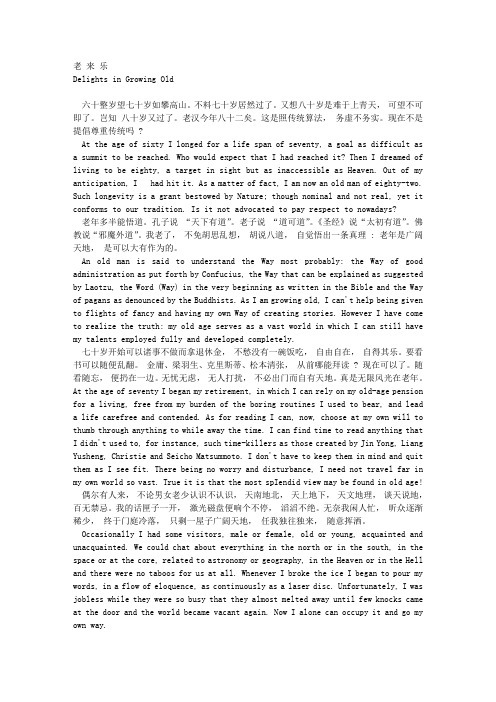
老来乐Delights in Growing Old六十整岁望七十岁如攀高山。
不料七十岁居然过了。
又想八十岁是难于上青天,可望不可即了。
岂知八十岁又过了。
老汉今年八十二矣。
这是照传统算法,务虚不务实。
现在不是提倡尊重传统吗 ?At the age of sixty I longed for a life span of seventy, a goal as difficult as a summit to be reached. Who would expect that I had reached it? Then I dreamed of living to be eighty, a target in sight but as inaccessible as Heaven. Out of my anticipation, I had hit it. As a matter of fact, I am now an old man of eighty-two. Such longevity is a grant bestowed by Nature; though nominal and not real, yet it conforms to our tradition. Is it not advocated to pay respect to nowadays?老年多半能悟道。
孔子说“天下有道”。
老子说“道可道”。
《圣经》说“太初有道”。
佛教说“邪魔外道”。
我老了,不免胡思乱想,胡说八道,自觉悟出一条真理 : 老年是广阔天地,是可以大有作为的。
An old man is said to understand the Way most probably: the Way of good administration as put forth by Confucius, the Way that can be explained as suggested by Laotzu, the Word (Way) in the very beginning as written in the Bible and the Way of pagans as denounced by the Buddhists. As I am growing old, I can't help being given to flights of fancy and having my own Way of creating stories. However I have come to realize the truth: my old age serves as a vast world in which I can still have my talents employed fully and developed completely.七十岁开始可以诸事不做而拿退休金,不愁没有一碗饭吃,自由自在,自得其乐。
历届韩素音翻译大奖赛竞赛原文及译文
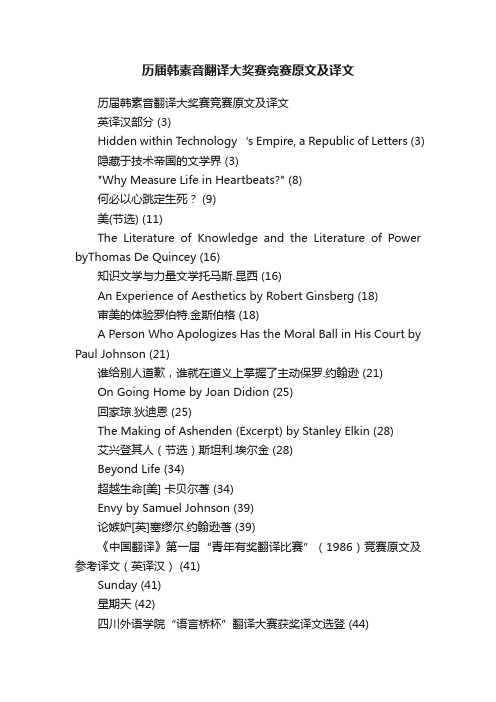
历届韩素音翻译大奖赛竞赛原文及译文历届韩素音翻译大奖赛竞赛原文及译文英译汉部分 (3)Hidden within Technology‘s Empire, a Republic of Letters (3)隐藏于技术帝国的文学界 (3)"Why Measure Life in Heartbeats?" (8)何必以心跳定生死? (9)美(节选) (11)The Literature of Knowledge and the Literature of Power byThomas De Quincey (16)知识文学与力量文学托马斯.昆西 (16)An Experience of Aesthetics by Robert Ginsberg (18)审美的体验罗伯特.金斯伯格 (18)A Person Who Apologizes Has the Moral Ball in His Court by Paul Johnson (21)谁给别人道歉,谁就在道义上掌握了主动保罗.约翰逊 (21)On Going Home by Joan Didion (25)回家琼.狄迪恩 (25)The Making of Ashenden (Excerpt) by Stanley Elkin (28)艾兴登其人(节选)斯坦利.埃尔金 (28)Beyond Life (34)超越生命[美] 卡贝尔著 (34)Envy by Samuel Johnson (39)论嫉妒[英]塞缪尔.约翰逊著 (39)《中国翻译》第一届“青年有奖翻译比赛”(1986)竞赛原文及参考译文(英译汉) (41)Sunday (41)星期天 (42)四川外语学院“语言桥杯”翻译大赛获奖译文选登 (44)第七届“语言桥杯”翻译大赛获奖译文选登 (44)The Woods: A Meditation (Excerpt) (46)林间心语(节选) (47)第六届“语言桥杯”翻译大赛获奖译文选登 (50)第五届“语言桥杯”翻译大赛原文及获奖译文选登 (52)第四届“语言桥杯”翻译大赛原文、参考译文及获奖译文选登 (54) When the Sun Stood Still (54)永恒夏日 (55)CASIO杯翻译竞赛原文及参考译文 (56)第三届竞赛原文及参考译文 (56)Here Is New York (excerpt) (56)这儿是纽约 (58)第四届翻译竞赛原文及参考译文 (61)Reservoir Frogs (Or Places Called Mama's) (61)水库青蛙(又题:妈妈餐馆) (62)中译英部分 (66)蜗居在巷陌的寻常幸福 (66)Simple Happiness of Dwelling in the Back Streets (66)在义与利之外 (69)Beyond Righteousness and Interests (69)读书苦乐杨绛 (72)The Bitter-Sweetness of Reading Yang Jiang (72)想起清华种种王佐良 (74)Reminiscences of Tsinghua Wang Zuoliang (74)歌德之人生启示宗白华 (76)What Goethe's Life Reveals by Zong Baihua (76)怀想那片青草地赵红波 (79)Yearning for That Piece of Green Meadow by Zhao Hongbo (79)可爱的南京 (82)Nanjing the Beloved City (82)霞冰心 (84)The Rosy Cloud byBingxin (84)黎明前的北平 (85)Predawn Peiping (85)老来乐金克木 (86)Delights in Growing Old by Jin Kemu (86)可贵的“他人意识” (89)Calling for an Awareness of Others (89)教孩子相信 (92)To Implant In Our Children‘s Young Hearts An Undying Faith In Humanity (92)心中有爱 (94)Love in Heart (94)英译汉部分Hidden within Technology’s Empire, a Republic of Le tters 隐藏于技术帝国的文学界索尔·贝娄(1)When I was a boy ―discovering literature‖, I used to think how wonderful it would be if every other person on the street were familiar with Proust and Joyce or T. E. Lawrence or Pasternak and Kafka. Later I learned how refractory to high culture the democratic masses were. Lincoln as a young frontiersman read Plutarch, Shakespeare and the Bible. But then he was Lincoln.我还是个“探索文学”的少年时,就经常在想:要是大街上人人都熟悉普鲁斯特和乔伊斯,熟悉T.E.劳伦斯,熟悉帕斯捷尔纳克和卡夫卡,该有多好啊!后来才知道,平民百姓对高雅文化有多排斥。
第十七届韩素音翻译大赛英译汉部分原文[策划]
![第十七届韩素音翻译大赛英译汉部分原文[策划]](https://img.taocdn.com/s3/m/aac8e447ac02de80d4d8d15abe23482fb4da02c8.png)
第十七届韩素音翻译大赛英译汉部分原文Beauty (excerpt)Judging from the scientists I know, including Eva and Ruth, and those I’ve read about, you can’t pursue the laws of nature very long without bumping into beauty. “I don’t know if it’s the same beauty you see in the sunset,” a friend tells me, “but it feels the same.” This friend is a physicist, who has spent a long career deciphering what must be happening in the interior of stars. He recalls for me this thrill on grasping for the first time Dirac’s equations describing quantum mechanics, or those of Einstein describing relativity. “They’re so beautiful,” he says,” you can see immediately they have to be true. Or at least on the way toward trut h.” I ask him what makes a theory beautiful, and he replies, “Simplicity, symmetry, elegance, and power.”Why nature should conform to theories we find beautiful is far from obvious. The most incomprehensible thing about the universe, as Einstein said, is that it’s comprehensible. How unlikely, that a short—lived biped on a two--bit planet should be able to gauge the speed of light, lay bare the structure of an atom, or calculate the gravitational tug of a black hole. We’re a long way from understanding everything, but we do understand a great deal about how nature behaves. Generation after generation, we puzzle out formulas, test them, and find, to an astonishing degree, that nature agrees. An architect draws designs on flimsy paper, and her buildings stand up through earthquakes. We launch a satellite into orbit and use it to bounce messages from continent to continent. The machine on which I write these words embodies hundreds of insights into the workings of the material world, insights that are confirmed by every burst of letters on the screen, and I stare at thatscreen through lenses that obey the laws of optics first worked out in detail by Issac Newton.By discerning patterns in the universe, Newton believed, he was tracing the hand of God. Scientists in our day have largely abandoned the notion of a Creator as an unnecessary hypothesis, or at least an untestable one. While they share Newton’s faith that t he universe is ruled everywhere by a coherent set of rules, they cannot say, as scientists, how these particular rules came to govern things. You can do science without believing in a divine Legislator, but not without believing in laws.I spent my teenage years scrambling up the mountain of mathematics. Midway up the slope, I staggered to a halt, gasping in the rarefied air, well before I reached the heights where the equations of Einstein and Dirac would have made sense. Nowadays I add, subtract, multiply, and do long division when no calculator is handy, and I can do algebra and geometry and even trigonometry in a pinch, but that is about all that I’ve kept from the language of numbers. Still, I remember glimpsing patterns in mathematics that seemed as bold and beautiful as a skyful of stars.I’m never more aware of the limitations of language than when I try to describe beauty. Language can create its own loveliness, of course, but it cannot deliver to us the radiance we apprehend in the world, any more than a photograph can capture the stunning swiftness of a hawk or the withering power of a supernova. Eva’s wedding album holds only a faint glimmer of the wedding itself. All that pictures or words can do is gesture beyond themselves toward the fleeting glory that stirs our hearts. So I keep gesturing.“All nature is meant to make us think of paradise,”Thomas Merton observed. Because the Creation puts on a nonstop show, beauty is free and inexhaustible, but we need training in order to perceive more than the most obvious kinds. Even 15 billion years or so after the Big Bang, echoes of that event still linger in the form of background radiation, only a few degrees above absolute zero. Just so, I believe, the experience of beauty is an echo of the order and power that permeate the universe. To measure background radiation, we need subtle instruments; to measure beauty, we need alert intelligence and our five keen senses.Anyone with eyes can take delight in a face or a flower. You need training, however, to perceive the beauty in mathematics or physics or chess, in the architecture of a tree, the design of a bird’s wing, or the shiver of breath through a flute. For most of human history, the training has come from elders who taught the young how to pay attention. By paying attention, we learn to savor all sorts of patterns, from quantum mechanics to patchwork quilts. This predilection brings with it a clear evolutionary advantage, for the ability to recognize patterns helped our ancestors to select mates, find food, avoid predators. But the same advantage would apply to all species, and yet we alone compose symphonies and crossword puzzles, carve stone into statues, map time and space.Have we merely carried our animal need for shrewd perceptions to an absurd extreme? Or have we stumbled onto a deep congruence between the structure of our minds and the structure of the universe?I am persuaded the latter is true. I am convinced there’s more to beauty than biology, more than cultural convention. It flows around and through us in such abundance, and in such myriad forms, as to exceed by a wide margin any mereevolutionary need. Which is not to say that beauty has nothing to do with survival: I think it has everything to do with survival. Beauty feeds us from the same source that created us. It reminds us of the shaping power that reaches through the flower stem and through our own hands. It restores our faith in the generosity of nature. By giving us a taste of the kinship between our own small minds and the great Mind of the Cosmos, beauty reassures us that we are exactly and wonderfully made for life on this glorious planet, in this magnificent universe.I find in that affinity a profound source of meaning and hope.A universe so prodigal of beauty may actually need us to notice and respond, may need our sharp eyes and brimming hearts and teeming minds, in order to close the circuit of Creation.美在其中(节选)我认识的科学家,像伊凡和卢斯,还有我通过阅读了解的科学家,普遍认为人们在探索自然界规律的过程中,很快便能与美不期而遇。
- 1、下载文档前请自行甄别文档内容的完整性,平台不提供额外的编辑、内容补充、找答案等附加服务。
- 2、"仅部分预览"的文档,不可在线预览部分如存在完整性等问题,可反馈申请退款(可完整预览的文档不适用该条件!)。
- 3、如文档侵犯您的权益,请联系客服反馈,我们会尽快为您处理(人工客服工作时间:9:00-18:30)。
英译汉竞赛原文:The Posteverything GenerationI never expected to gain any new insight into the nature of my generation, or the changing landscape of American colleges, in Lit Theory. Lit Theory is supposed to be the class where you sit at the back of the room with every other jaded sophomore wearing skinny jeans, thick-framed glasses, an ironic tee-shirt and over-sized retro headphones, just waiting for lecture to be over so you can light up a Turkish Gold and walk to lunch while listening to Wilco. That’s pretty much the way I spent the course, too: through structuralism, formalism, gender theory, and post-colonialism, I was far too busy shuffling through my Ipod to see what the patriarchal world order of capitalist oppression had to do with Ethan Frome. But when we began to study postmodernism, something struck a chord with me and made me sit up and look anew at the seemingly blasécollege-aged literati of which I was so self-consciously one.According to my textbook, the problem with defining postmodernism is that it’s impossible. The difficulty is that it is so...post. It defines itself so negatively against what came before it – naturalism, romanticism and the wild revolution of modernism – that it’s sometimes hard to see what it actually is. It denies that anything can be explained neatly or even at all. It is parodic, detached, strange, and sometimes menacing to traditionalists who do not understand it. Although it arose in the post-war west (the term was coined in 1949), the generation that has witnessed its ascendance has yet to come up with an explanation of what postmodern attitudes mean for the future of culture or society. The subject intrigued me because, in a class otherwise consumed by dead-letter theories, postmodernism remained an open book, tempting to the young and curious. But it also intrigued me because the question of what postmodernism –what a movement so post-everything, so reticent to define itself – is spoke to a larger question about the political and popular culture of today, of the other jaded sophomores sitting around me who had grown up in a postmodern world.In many ways, as a college-aged generation, we are also extremely post: post-Cold War, post-industrial, post-baby boom, post-9/11...at one point in his famous essay, “Postmodernism, or the Cultural Logic of Late Capitalism,”literary critic Frederic Jameson even calls us “post-literate.”We are a generation that is riding on the tail-end of a century of war and revolutionthat toppled civilizations, overturned repressive social orders, and left us with more privilege and opportunity than any other society in history. Ours could be an era to accomplish anything.And yet do we take to the streets and the airwaves and say “here we are, and this is what we demand”? Do we plant our flag of youthful rebellion on the mall in Washington and say “we are not leaving until we see change! Our eyes have been opened by our education and our conception of what is possible has been expanded by our privilege and we demand a better world because it is our right”? It would seem we do the opposite. We go to war without so much as questioning the rationale, we sign away our civil liberties, we say nothing when the Supreme Court uses Brown v. Board of Education to outlaw desegregation, and we sit back to watch the carnage on the evening news.On campus, we sign petitions, join organizations, put our names on mailing lists, make small-money contributions, volunteer a spare hour to tutor, and sport an entire wardrobe’s worth of Live Strong bracelets advertising our moderately priced opposition to everything from breast cancer to global warming. But what do we really stand for? Like a true postmodern generation we refuse to weave together an overarching narrative to our own political consciousness, to present a cast of inspirational or revolutionary characters on our public stage, or to define a specific philosophy. We are a story seemingly without direction or theme, structure or meaning – a generation defined negatively against what came before us. When Al Gore once said “It’s the combination of narcissism and nihilism that really defines postmodernism,” he might as well have been echoing his entire generation’s critique of our own. We are a generation for whom even revolution seems trite, and therefore as fair a target for bland imitation as anything else. We are the generation of the Che Geuvera tee-shirt.Jameson calls it “Pastiche”–“the wearing of a linguistic mask, speech in a dead language.” In literature, this means an author speaking in a style that is not his own – borrowing a voice and continuing to use it until the words lose all meaning and the chaos that is real life sets in. It is an imitation of an imitation, something that has been re-envisioned so many times the original model is no longer relevant or recognizable. It is mass-produced individualism, anticipated revolution. It is why postmodernism lacks cohesion, why it seems to lack purpose or direction. For us, the post-everything generation, pastiche is the use and reuse of the old clichés of social changeand moral outrage – a perfunctory rebelliousness that has culminated in the age of rapidly multiplying non-profits and relief funds. We live our lives in masks and speak our minds in a dead language – the language of a society that expects us to agitate because that’s what young people do. But how do we rebel against a generation that is expecting, anticipating, nostalgic for revolution?How do we rebel against parents that sometimes seem to want revolution more than we do? We don’t. We rebel by not rebelling. We wear the defunct masks of protest and moral outrage, but the real energy in campus activism is on the internet, with websites like . It is in the rapidly developing ability to communicate ideas and frustration in chatrooms instead of on the streets, and channel them into nationwide projects striving earnestly for moderate and peaceful change: we are the generation of Students Taking Action Now Darfur; we are the Rock the Vote generation; the generation of letter-writing campaigns and public interest lobbies; the alternative energy generation.College as America once knew it –as an incubator of radical social change –is coming to an end. To our generation the word “radicalism”evokes images of al Qaeda, not the Weathermen. “Campus takeover” sounds more like Virginia Tech in 2007 than Columbia University in 1968. Such phrases are a dead language to us. They are vocabulary from another era that does not reflect the realities of today. However, the technological revolution, the revolution, the revolution of the organization kid, is just as real and just as profound as the revolution of the 1960’s – it is just not as visible. It is a work in progress, but it is there. Perhaps when our parents finally stop pointing out the things that we are not, the stories that we do not write, they will see the threads of our narrative begin to come together; they will see that behind our pastiche, the post generation speaks in a language that does make sense. We are writing a revolution. We are just putting it in our own words.。
